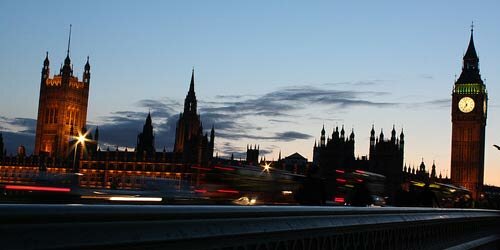Why Britain needs a new politics of race too
12:24 am - January 20th 2009
| Tweet | Share on Tumblr |
 Four million Americans descend on Washington today, inspired by Barack Obama’s call for progressive change. Many want to see history made: the inauguration of the first black President of the United States. Then President Obama can get on with the real job of being America’s 44th President, to be judged on his economic stimulus, healthcare push and willingness to engage on climate change and Middle East peace.
Four million Americans descend on Washington today, inspired by Barack Obama’s call for progressive change. Many want to see history made: the inauguration of the first black President of the United States. Then President Obama can get on with the real job of being America’s 44th President, to be judged on his economic stimulus, healthcare push and willingness to engage on climate change and Middle East peace.
But Obama can never quite be a politician who just happens to be black. He is a transitional figure in the way we talk about race. Most of the armchair theorising has been proved wrong: was Obama ‘not black enough’ to be credible with African-Americans, or too black to win blue collar votes? Could he identify as black at all when he is also mixed race? The next black Presidential candidate will face less of this nonsense, because America has thought out loud about its confusions over race.
Can we have a ‘British Obama’? Yes, we can.
He has inspired a positive refusal to accept that ceilings and barriers cannot be smashed. When it happens depends on an exceptional individual having the talent (and luck) to seize the opportunity. What matters is scrutiny and action to ensure there are fair chances and no unfair barriers for candidates, of whatever background.
Obama will be a potent symbol in British debates too. But Britain is not America. Race was the central political cleavage in the United States in a civil war 150 years ago; the post-Windrush large scale black and Asian presence in Britain was just three generations ago. The US civil rights movement and Martin Luther King inspired campaigners for equality. But sometimes we have inherited antagonism from the US, over affirmative action or political correctness, which is less relevant here.
The barriers to a British Obama reaching the top are not about race, but about our political institutions. The Parliamentary system places great weight on long apprenticeships. No post-war British Prime Minister has yet reached Downing Street less than a decade after entering Parliament: the average is a staggering 26 years. That slows down a British Sarah Palin too. Experience matters, but politics needs new ideas and energy too.
Today only 15 MPs are non-white – 13 of them Labour. But Fabian research into candidate selections suggests we have reached a ‘tipping point’ towards fair chances, especially in the Labour Party. Only 2% of Labour MPs in the class of 1997 were black and Asian, but that rose to 7.5% by 2005, when the population is 8% non-white. 10% of new candidates from non-white backgrounds in current selections. Conservatives and LibDem efforts to make progress from a low base should be supported, but the evidence contradicts the offensive idea that Labour is institutionally racist. Rather it is the first party in western Europe which can stake a claim to have broken through an “ethnic penalty” to fair chances.
But will these positive changes go deeper than extending to black and Asian lawyers and Oxbridge graduates similar chances to join their white peers in the political class? That demands much greater scrutiny of how financial and time commitments in candidate selections prevent a level playing field.

A ConservativeHome survey found would-be Tory candidates spent an average of around £20,000 trying to get selected, and over £34,000 if lost income was accounted for too. The time demands – campaigning across the country to show keenness – demand a professional job, and make little allowance for family commitments. So women, working-class candidates of all races, and those outside the elite do not get a fair shot.
Obama will find that America is still confused about race. He will be told that the fact he is President is proof that nothing more needs to be done. Yet he will be attacked too – perhaps by the mid-term elections in 2010 – with evidence that his Presidency has not yet stopped black Americans being poorer, or more likely to be on death row. Such is politics.
But this may also help him to make the real argument. Refusing to be defined solely by race does not mean ignoring it. When the controversy over his pastor threatened to derail Obama’s campaign, he ignored the textbook advice to close the story down and get back on message, instead engaging in a thoughtful, complex discourse whose rejection of America’s angry polarisation around race was strengthened by his effort to understand it.
He argued that race still matters but that progressive politics now must tackle race and class together. Obama’s books make this point more strongly than any US politician since LBJ. While supporting action to promote equal opportunity, he says that “my daughters should be treated as folks who are pretty advantaged. I think we should take into account white kids who have been disadvantaged and have grown up in poverty”.
The irony is that Labour in Britain has last week been attacked in absurd, lurid terms over ‘class war’ for making the same fairness argument as Obama.
Many people praise Barack Obama for closing America’s culture wars. He does so by recognising an obvious truth: class matters. If we want a fairer Britain, we must, like Obama, mobilise broad coalitions to make change possible. That is why we too need a new politics of race.
| Tweet | Share on Tumblr |  |
Sadiq Khan MP is the new Chair of the Fabian Society, of which Sunder Katwala is General Secretary. They both spoke on 'Does the politics of race need to move on?' at Saturday's Fabian new year conference, fabians.org.uk
· Other posts by Sadiq Khan MP and Sunder Katwala
Story Filed Under: Blog ,Foreign affairs ,Race relations ,United States
Sorry, the comment form is closed at this time.
Reader comments
He argued that race still matters but that progressive politics now must tackle race and class together.
Yup. Well, race, class and gender too.
Obama didn’t win without a huge amount of financial support. I suspect these corporate interests will be his first priority, just as with any other President. The far more drastic change in South Africa has done little to elevate the material conditions of most Black people there. I hope that Obama’s victory is the start of something significant but it might be as premature to celebrate this as a victory for Black Americans as it was to celebrate Thatcher’s Prime Ministership as a victory for feminism.
In fact your description of Obama as someone who has successfully smashed through the barriers to seize the highest position in the country will probably be used against those who ‘fail’ to seize their own ‘opportunity’.
This ‘British Obama’ phrase really irritates me as it’s always used to denote whether we could have a leading or the leading politician as someone who’s black. This article certainly does not fall into simply defining Obama by race, but there are many others that have.
Action on the environment, civil liberties, war, the middle east, and so much more are the key areas we need to more forwards on. The key message of Obama’s campaign was about empowerment (over fear), solidarity. Yes, let’s have that government.
Now as it happens I think Obama’s colour helped encapsulate that progressive package but I really think we do Obama a disservice when we think the most important thing about him is his colour – it’s important, but not nearly as crucial as the fact we have an opportunity to reverse the neo-liberal policies of the Bush years.
ps I’ll put my caveat in again in case it gets lost – I don’t think the authors of this piece fell into this trap particularly, this is a general point about the way many commentators seem to have depoliticised Obama.
In fact your description of Obama as someone who has successfully smashed through the barriers to seize the highest position in the country will probably be used against those who ‘fail’ to seize their own ‘opportunity’.
This is what is known as an “Ideal”. While accepting the negative potential of that, it’s something which exists with almost any concept, although views of what it is vary. The only thing that’s changed is that there’s now an example of it that most people could pretty much agree on, and at least the majority of the world has heard of.
A stick? An inspiration? Either way, it’s a success. So cheer the fuck up. :3
The most pertinent sentence in this whole article? women, working-class candidates of all races, and those outside the elite do not get a fair shot.
I’ve yet to see anyone posing a solution to this that does not involve the patronising and illiberal measure euphemistically referred to here as Affimative Action.
When are we going to change the system so that this systemic failure doesn’t happen any more, rather than trying to force candidates of all genders and races to fit the white middle class man’s system?
When the binary has been dissolved and racial dichotomies have disintegrated through interbreeding.
I would suggest term limits on MPs as one option. Politics is a career game at the moment, and one that doesn’t appreciate forays into other activities (whether maternity or unrelated careers). This makes it a game for male politics geek, whoever is the equivalent of the landed gentry today, and a handful of rich middle class women.
If you made it so that MPs could only serve 2 or 3 parliamentary terms (or 10 or 15 years), then the life career option suddenly make less sense. You would have more people having a chance to be MPs in total, and hopefully a slightly different set of people too.
Nick: I’d suggest that that wouldn’t improve things too much. The constant churn and turn-over would mean that we’d struggle to keep on finding competent ministers up for it, and the parties would probably still just shove people wanting to augment their CVs up for the positions.
“competent ministers” – what’s that, exactly? Ministers right now get selected more or less on the basis of their position within party hierarchies.
You might be right though. Looking over the literature, there doesn’t seem to be an obvious case for term limits helping minorities.
Slightly bizarre piece, isn’t it?
Either
a) you go for ‘global’, all-round fairness, taking note of all of race, gender, sexuality, class, disability etc etc
or
b) you focus on those (identity) elements separately.
What this article appears to try and do is to recognise that there is more sense in approach a), as it’s less divisive (less pitching of identity groups against each other), and because none of those factors of race,class,gender,etc etc exist in isolation from each other. Good: an overall, overarching approach definitely has its merits
BUT
the authors then dub it “politics of race”, in effect subsuming all other inequalities into the race one, in other words implying a divisive hierarchy of discrimination. Such a hierarchy exists at the moment, and is encouraged by some who encourage it and its divisons as it allows them them to empire-build/reign over their little fiefdoms, while corroding wider society, by fragmenting it.
[Oh, Obama is black. Hurray. It's nonsense to suggest he's not male, not relatively privileged, not straight, not 'able-bodied',not an acceptable age, not free from any mental health problems etc. His message has been of hope, notably taking that beyond race, being inclusive, not taking all areas of discrimination and putting them in a box marked race]
I really don’t get along with this idea that we need a “British Obama”, the connotation always being that we somehow must have a leader that is black, or perhaps disabled, or female (again). Now, if the connotation is instead that we need someone not afraid to mix things up and make movements for fairness and equality, regardless of their characteristics, then I apologise and agree completely.
Firstly ,by fairness , in yet another sinister New Labour piece of Orwellian linguistic vandalism, you mean equality and socialism . This is not fair , but if it was such childish utopian dreaming has been tested to destruction on many occasions. It makes little difference if everyone is on the same deckchair if the boat is sinking and ‘prizes for all’ does not work . Stop abusing the language
Thus far, in order to attain this equality you have given black and Asian middleclass go getters a quite unnecessary leg up at the expense of others with more talent ,who may have also overcome more disadvantage . This counting up of the differently pigmented is obscene racist and produces craven yes men , and women, reliant on favour . The Blair babes are a conspicuous example of the over promoted token . More broadly you have removed money from those who earn it and giving it to those who do not . Fair ?
.
What I like about this piece is that it does , quite thoughtfully , address the problem that by focussing on every category but class you end up alienating the white working class . This is problem for the Labour movement who like to pretend they care about such things and from whom their money is extracted via the unions . (The subject of much agonising in the New Statesman for years now ) The problem you have is in trying to placate the first losers in your trendy victim of the day schemes you have mixed two quite different categories .
Class is what is called an ” achieved characteristic “ whereas race and sex are “ascribed” at birth . Successful children can indeed become middleclass whereas barring Michael Jackson black men do not often be come white women. The crux of the argument is that disadvantages encountered like lack of parental support and the expensive schools enjoyed by Harriet Harman and Polly Toynbee`s children is a impenetrable barrier . This is simply not true .
Research done on those born in 1958 shows the largest factor determining someone’s class destination is IQ accounting for half the explained variance in class variance . The amount of work is the next largest factor . The combined effects of class privilege or disadvantage are 17 % of the explained variance ( This from Professor Emeritus Peter Saunders but the research is well known.)
If you look a the matter multi generationally the compounding of non class effects are overwhelmingly predominant . The fact is then that a clever hard working boy despite Labour`s efforts to stop him , has a very good chance of changing his class . His children will suffer virtually no significant barrier if the characteristic are inherited .( Labour again wished to stop this movement by loading up inheritance tax and have not understood why it was so hated ).
I have more to complain about .There is no-one like me in Parliament , a normal working bread winner in private sector career who has not made a dot com killing . I rather like Nick`s ideas. The relatively unimportant matter of the shape of the Parliamentary career is one which you are unwise to tamper with. It currently favours either those with inherited money or union / public sector employees without competitive careers . The result is the ‘all rights no responsibilities’ infantilised society we see around us .
PS I should say that while I do not like the direction of ravel personally that was by far the best article on this site for a long time and I may have been a bit harsher than I meant to be . It does identify some of the problems I raise itself
I agree with Jim Jay. The least important thing about Barack Obama is the colour of his skin.
Ideally we should aim for a politics without race.
A stick? An inspiration? Either way, it’s a success. So cheer the fuck up. :3
I agree with James , I want to no special pleading for my boys but the symbol of Obama can help by raising aspirations and expectations .Mixed race families are indeed the fastest growing group by the way
Obama both is and is not black, in the US sense. He has a black skin, sure, but he is not of slave descent.
As far as this country is concerned, the situation is quite different. We kept our slaves well offshore, and feel good because we “emancipated” them and then granted the lands we had transplanted them into their independence. Thus, unlike black South Africans, we denied them the historical narrative of self-respect that comes with liberation struggle. Never underestimate this. If you look around the world at peoples, communities and ethnic groups which have high self-esteem they all share one thing in common. They have either liberated themselves, conquered where they live or identify themselves as the descendents of those who have done so. (This is the bottom-line reason why the Israel-Palestine tragedy is so intractable.)
Even if Parliament contained the same proportion of black, Muslim and other Asian women and men as exists in the population this would not fulfil that precondition for self-esteem.
Newmania @ 16,
Now, here’s a first. I agree with you too.
Mike @ 17,
What!
and feel good because we “emancipated” them and then granted the lands we had transplanted them into their independence.
The Royal Navy spent much of the 19th c blockading slaver ports and attempting to stop the slave trade.
Now, that is a commitment you don’t see much of nowadays.
http://www.royalnavy.mod.uk/server/show/nav.5934
One interesting thing about the history of slavery and Empire is that they did not happen at the same time . By the latter half of the 19th century when Africa was being shared out slavery was long gone and its high point had been in the previous century when Africas heartland was closed to Europeans . Slavery then was essentially conducted by Africans and Arabs who have not stopped as well as Europeans who have . We owe no-one an apology
This rapid movement throws up many ironies . The Gladstones went from nothing to dominating the 19th century in two generations with slave money. Gladstone’s early speeches on slavery are quiet ambivalent and yet he lead the non conformist constituency so important to the discovery of social conscience .Mrs . N is descended both from slaves in Trinidad and from Henry Morgan the famous slaver and Governor of Jamaica ( we try to keep the Welsh bit quiet)
Its like the stars you can make any shape out of it you like .
Newmania,
Did we, or did we not, try to stop the trade?
Otherwise it is you that is looking at the stars and fixing your own pattern on them.
I have said this before, and I’ll no doubt say it again. If Sunny Hundal stood in my constituency, I’d vote for him, across party lines if need be. Because I think he talks sense, not because of the colour of his skin.
I’d like to think most folk that read or write on this site can see beyond superficial differences.
Sorry lack of punctuation
Yes we stopped it DC which is why I laughed at Ken Livingstone crying on our behalf about the whole phase of history. Not only did we stop it, but it was carried out by Africans, as well, without whom it could not have started .When Europeans left they immediately returned to enslaving each other. I was referring to the mental gymnastics required to load guilt on the West for what was an immemorial human practice ,outlawed by this great country.
Because slavery is so ubiquitous endless narratives of blame are possible, and that was the star gazing I meant .The same is true generally of race guilt
. For example , many Asians in this country actually arrive from Africa where they formed part of the British civil service. Perceived as a self serving class of parasites they were kicked out by the blacks, notably from Uganda, ( Same in Fiji , and elsewhere ). Thus we acquired a well educated middleclass group of Indian people, They have done generally very well for themselves . This same group strangely enough are prominent in what they sometimes call ‘Black rights ’
It is somewhat ironic that the very people who that pillar of moral authority Idi Amin kicked out for exploiting the blacks are often to be found claiming to be victims .They are usually the reverse by virtue of class .
This group are often the lawyers etc. who use pigment quotas to help their careers in the media and politics .Of course they will say are ..“Yes but if you had not conquered India …..“…..and so we get into star gazing .
The narrative of the Ugandans is right in outline . The question of who benefits from black quotas is an ethnic as well as a class problem
Thanks for comments. Will come back to respond, but probably after the inauguration.
#17 “We kept our slaves well offshore, and feel good because we “emancipated” them and then granted the lands we had transplanted them into their independence. Thus, unlike black South Africans, we denied them the historical narrative of self-respect that comes with liberation struggle.”
This is a guilt that only applies to small minority of the popluation. The “we” does not apply to me. My ancestors were working in the factories or the land and were denied basic rights and votes. I don’t share your guilt.
Some very well reasoned and articulated points, Newmania.
Tbh Chavscum I struggle to see even those descended from the highest aristocracy as “guilty”. Certainly they enjoy darkly acquire privileges, but would you prosecute a child for the crimes of their father? Do they deserve to suffer for an act they did not perform?
Well, the IDF seem to think so, but that’s by-the-by…
[26] “Guilt” is your concept, not mine. However, it is also one applied by significant sections of the black and Asian citizenry who see policies labelled as “race equality” as fundamentally hypocritical, insofar as they do not include any element of restitution. Indeed, it could be argued that the cleavage within blacks/Asians on this point is a significant part of the problem. I am not sure that white people have anything useful to say about it, though.
I am not sure that white people have anything useful to say about it, though.
Because obviously, when someone says something what’s important is what race they are, not what they’re saying.
[29] James, would you not agree that someone who has never lifted a golf club in anger probably doesn’t have anything useful to say about the design of golf courses?
I suppose just having everyone equal under the law is out of the question??????
I know..
We should try to equalise people using the law, I know it sounds a bit like discrimination again but this is GOOD we’re doing here!!!!!!!!!!!!!!!!
Obama may be the answer because he doesn’t believe in all the positive discrimination nonsense. He would prefer we just “judge a man by his character alone”.
Suits me.
James, would you not agree that someone who has never lifted a golf club in anger probably doesn’t have anything useful to say about the design of golf courses?
If they’ve played on nothing but good courses then they probably know better than anyone what one looks like…
If you look around the world at peoples, communities and ethnic groups which have high self-esteem they all share one thing in common. They have either liberated themselves, conquered where they live or identify themselves as the descendents of those who have done so.
Err, compare Haiti and Jamaica, Algeria and Morocco, Ireland and Scotland, Vietnam and Thailand, Kenya and Zimbabwe. None of them really match that picture: I suspect it is based mostly on some patriotic preference for the USA over Canada.
Sure, the military class likes winning wars. But in normal societies, that doesn’t mean all that much to many people in everyday life.
If anything, the correlation is basically backwards: nations with high self-esteem write historical narratives in which they star. The French in WWII come to mind, as does the relative absence of the French, Spanish and Dutch military in accounts of the US War of Independence.
[32] I was offering it as a necessary, not a sufficient condition. And FWIW – and accepting that London Scots and Irish may well be atypical – I’d say the latter had higher self-esteem than the former.
As to Haiti, well I always supposed that C L R James wrote his biography of Toussaint L’Ouverture because there was no equivalent figure to write about in the Anglophone Caribbean. I suspect that Haitians are indeed proud of that era in their history: Jamaicans etc have no equivalent. The pyschic consequence was well described by A.A. Milne:
It was perfectly disgraceful the way he behaved
He did nothing and nothing until he was saved
Reactions: Twitter, blogs
Sorry, the comment form is closed at this time.
NEWS ARTICLES ARCHIVE























